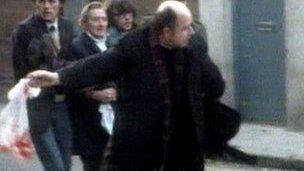An avalanche of debate
- Published
- comments

Thirteen people were shot dead on Bloody Sunday
The controversy over the PSNI's decision to re-investigate the Bloody Sunday killings has provoked an avalanche of debate.
Much of the commentary has focussed on the treatment of former paramilitaries who have been able to benefit from the two-year early release scheme provided under the Good Friday Agreement, and the contrasting fate which awaits any former soldiers or police officers facing charges for crimes committed before 1998.
This renewed discussion of "asymmetric justice" stirred memories of two moments in the past.
On the day the Saville report was published two years ago, I watched the scenes in Guildhall square from the walls of Derry.
I pinpointed the tribunal's finding that some soldiers may have opened fire on civilians in the "indefensible belief" they were members or supporters of the IRA so "deserved to be shot notwithstanding that they were not armed or posing any serious threat".
I reckoned then that this conclusion would provide the Public Prosecution Service with some pretty hard food for thought.
Infamous
The other episode which sprang to my mind is Peter Hain getting a rough ride in the House of Commons over his infamous "On The Runs Bill".
The bill extended what was to all intents and purposes an amnesty both to paramilitary fugitives and soldiers and police officers.
The Hansard of the debate in November 2005 is worth reading, external because the specific issue of the Bloody Sunday paratroopers is raised on several occasions.
If charged with murder, the former Secretary of State Hain argued that "the soldiers could choose to take advantage of what for them could be a beneficial process... it could be beneficial for them, because otherwise they would go through the normal court process and possibly be convicted and serve a sentence."
Mr Hain's offer of matching treatment, however, did not assuage his many critics.
'Absolutely opposed'
The Conservative Iain Duncan Smith, who served in Northern Ireland with the army, rejected the idea insisting that "no soldiers asked to go to Northern Ireland. They went because their government sent them to hold the peace. Therefore, it is reprehensible to treat them on the same basis as terrorists who ran from their crimes".
Mr Duncan Smith declared himself "absolutely opposed to the proposed process and I do not think it right for the secretary of state to use British soldiers as a shield in defence of what is wrong."
Unionist and SDLP MPs also opposed the measure.
Once Sinn Fein withdrew its support for the On The Runs Bill, the proposed amnesty fell.
Now the hypothetical conviction of soldiers on duty on Bloody Sunday discussed back in 2005 has taken a step closer towards reality.
Given the antipathy expressed by Conservative politicians and military chiefs to any equivalence between the army and paramilitaries, the chance of any fresh legislation introducing a troubles amnesty seems negligible.
Some soldiers did benefit from the Good Friday Agreement early release scheme, but ironically they were the so called "bad apples", external who carried out crimes on behalf of either the UVF or the UFF, so therefore came under the aegis of the 1998 Northern Ireland Offences Act.